Annual Report 2018
Annual Report 2018
We demand that public institutions be accountable, and with this report, we aim to lead by way of example. Read in detail about what we have achieved over the past year, what worked and what didn’t.
Our commitment: to conduct in-depth investigations until we bring about change
At Civio we believe that when we expose issues of poor governance or opacity, we have a duty to lobby until a solution is reached. That’s why we don’t drop the subject areas we work on—from pardons to public procurement, from temporary employment contracts to institutional advertising campaigns—until we truly effect change. Our job by no means ends when you read our articles. We’d like to encourage you to read this profile compiled on our organization by NiemanLab, on what makes us different.
This is our fifth Annual Report, an exercise we undertake each year with enthusiasm, candor, and a critical eye, to maintain the trust that so many people place in us, a number that is growing by the day. You can also browse the reports from 2017, 2016, 2015 and 2014).
More journalism
We remain committed to thorough, independent and in-depth reporting, harnessing highly specialized knowledge, through an intense analysis of data, and open methodologies. This allows us to furnish exclusive reports that are often beyond the reach of other media. The results of this are:
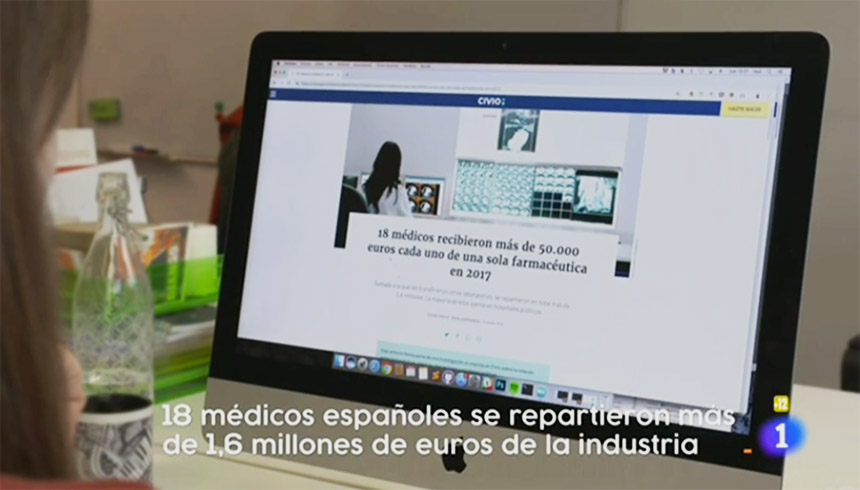
Our investigation into the economic links between pharmaceuticals and healthcare professionals in Comando Actualidad
- Journalism that monitors those in power to provide exclusive and hitherto unreleased reports on bad practice in governance. For example, we have revealed that even the partners and family members of the previous government’s advisers traveled in official planes; that almost one out of four pardons granted in 2017 was given to people convicted of corruption; that the Court of Audit side-steps its own law and hand-picks staff without due procedure for tasks supposedly reserved for civil servants; that companies in the ‘fire cartel’ continue to use anti-competitive practices to secure government contracts; that over 500 civil servants have lost their jobs due to convictions since 1996, with some 100 convicted of embezzlement; or that 80% of state enterprises continue to ignore the Equality Law in their governing bodies, ten years after it came into force.
- Far-reaching, multi-media journalism such as Medicamentalia - Contraceptives, through which we have shone a light on the obstacles faced by millions of women in accessing the contraceptives they need. In addition, we also explain how the major religions limit their freedom of choice, and we present their true stories. Here, you can read the entire Medicamentalia series since 2015—it has been awarded Best Investigation 2016 at the Data Journalism Awards, the Gabriel García Márquez 2016 Award in Innovation, and it was a runner up for the European Press Prize and the DIG Award. In 2018 we also published a new long-term investigation into transparency in the pharmaceuticals industry and the payments—both direct and indirect—that laboratories make to healthcare professionals. Furthermore we told the story, direct from the field, of hundreds of immigrants who were returning to the Gambia from Libya, having crossed the desert, been scammed by traffickers, abused and sold as slaves on the final frontier of their journey to Europe.
CONSULTA AQUÍ si tienes derecho al bono social eléctrico https://t.co/L38bCKbWLJ pic.twitter.com/iZekFMBLMW
— laSexta Noticias (@sextaNoticias) 21 de septiembre de 2018
- Public service journalism. Sometimes, reporting on complex subjects just isn’t enough. We have to move beyond words to ensure that the message reaches those who need to hear it the most. That’s why we created a tool to help all consumers check if they are eligible for the ‘bono social’ social rate on electricity bills. Subsequently, we reported that almost 2 million households were at risk of losing said aid. And together with the National Committee for Markets and Competition (MCNAB), we improved our app and made it available to hundreds of citizens and vulnerable groups, town councils, consumer organizations and the media. Over 30,000 people have already used it to check whether they have the right to state electricity subsidies. Nothing has made us more proud this year than the dozens of people who have written to us to tell us that they were able to secure access to the bono social social rate with our help. And that wasn’t all: we also made it easier to check if a person is eligible for rental subsidies for housing, explaining this new decree in detail and describing the implications of Sanidad (the Ministry of Health) freezing the price decreases for certain essential medicines, after laboratories threatened to stop selling them.
We have also yet again demonstrated that exceptional journalism can be done outwith the mainstream media. Thus, our investigations into healthcare access and the relationship between doctors and laboratories were awarded the Best Journalistic Work in the field of Data Science at the Data Science Awards 2018, as well as the Albert Jovell prize for the Best Journalistic Work in the healthcare field 2018. We were also finalists in the Journalistic Excellence 2018 awards by the Inter-American Press Association and for the Best Data Journalism Team at the Data Journalism Awards 2018. And it doesn’t end there: moving forward, we’re busy building an international network of journalists from different countries to share information and carry out joint investigations into subjects related to healthcare and the access to drugs. The highlight, however, has been that over 1,300,000 readers—who are extremely well informed about public affairs and institutional workings—endorse us, and that on a daily basis we’re able to inform you of the decisions public authorities are making and how these affect you—without relying on others’ agendas.
In figures:
-
134 articles published in 2018.
-
1.3 million readers.
-
5 mainstream media collaborations on international investigations: World (Netherlands), MO* Magazine (Belgium), EuroScientist (France), eldiario.es and La Sexta Noticias (Spain).
-
Our data has been the source of over 150 articles in local, regional, national and international media.
Goal set out in the 2018 Action Plan:
Carry out more collaborative and transnational investigations
Maintain and update current projects
More advocacy
The social and cultural changes we seek don’t materialize by themselves, meaning that we expend huge effort to ensure you can access key information regarding public administration. And we do so by harnessing an exhaustive knowledge of the rules, and requesting very specific reforms which target the fields we seek to improve, both in detail and in general. That’s why we lobby so much. But in which direction?
- We have continued to demand action rather than promises. That’s why we have highlighted to the government that throughout 2018, not a single advance in transparency has been made. Questions such as the absence of a regulation for the Transparency Act (four years after it came into force and following two unsuccessful drafts during the previous government), regulation of the activities of interest groups, the publication of senior officials’ work and meetings schedules, or the renewal of the presidency on the Council for Transparency, have failed to make the light of day. For this reason, we have maintained a critical and demanding stance at all times. This isn’t going to change, no matter who is in power.
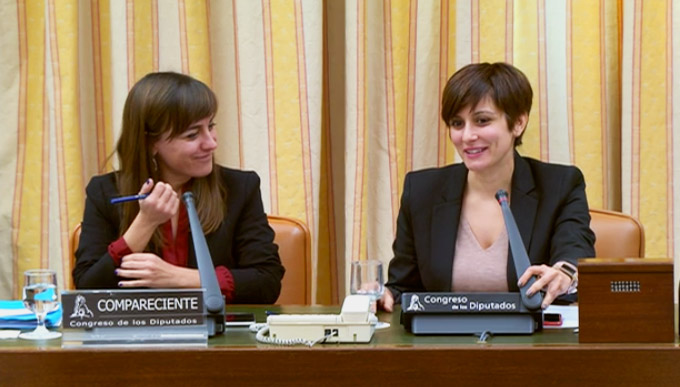
Eva Belmonte at the Justice Commission of the parliament
- We’ve exploited everything we know about pardons to propose a change to this law in parliament, one that is not used for self-serving electoral purposes. We championed this proposal during our attendance at the Justice Commission of the National Parliament into reform of the Pardons Law.
- With everything we know about how lobbies exert their influence, we are pushing for their activities to be regulated in a more transparent way in parliament, and for senior officials to make their work and meetings schedules public.
- We have also opposed opacity within public administrations more strongly than ever. We not only compile hundreds of requests for information every year: we go far beyond. We have two ongoing cases at the Supreme Court, one against the National High Court ruling that seeks to block access to public information prior to December 2014, and another against the refusal of the Court of Auditors to reveal which advisers were appointed without due regard to procedure. None of this would be possible without the help of our trustee and lawyer, Javier de la Cueva. For the same reasons, we are appealing the Government’s refusal to reveal the program code used by electricity providers to assess whether a citizen can access government aid for electricity bills. We don’t care which party is in government: what we’re demanding is transparent and accountable institutions.
At Civio, we lead by way of example. Our relationship with the public authorities and officials is transparent and non-partisan, as per our code of ethics. Since May 2015, we have published our own record of meetings. In 2018 we held 12 meetings with aim of influencing public policy. The attendees, topics covered, and documents exchanged, if any, are all completely public.
Goal set out in the 2018 Action Plan:
Improve transparency in public administration, increasing the information available on governmental activities and promoting access to this for all citizens.
More collaboration and training
We have continued to spread our knowledge and collaborate with the general public, other civil society organizations, and numerous public administrations.
With citizens
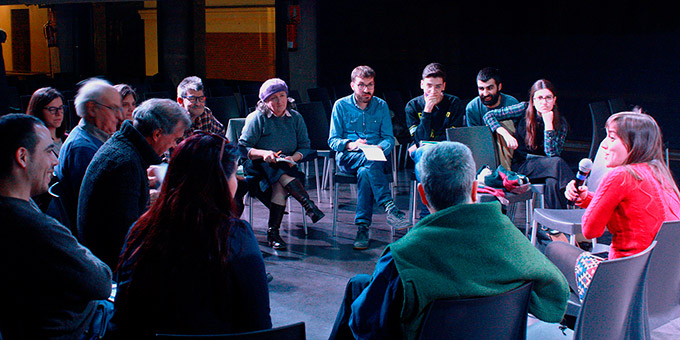
Debate on public procurement on Medialab-Prado
During the first quarter of 2018, we led a Medialab-Prado working group that brought together professionals from the public sector, national and international specialists in procurement, members of civil society, journalists and the general public, with the aim of together defining a more transparent model of public procurement, one that is designed to prevent corruption. As a result of this collaboration, Contratopedia was launched—a basic guide to understanding the most important aspects of the Public Sector Contracts Law—along with more than a dozen videos and presentations that have been made freely available.
Besides this, we shared our experience in a workshop on the right of access to public information in Barcelona, thanks to Societat Oberta, and held an online get-together in collaboration with the Unión Democrática de Pensionistas about the bono social (social rate) for electricity, and openly explaining the ins and outs of our investigation into contraceptives.
Daily monitoring and Members’ Mailbox
This year we have responded to more inquiries and questions from the public than ever before: from their eligibility for the bono social, to how to exercise their rights in the field of transparency, information that has been denied them, sources of information they haven’t heard of, technical queries and questions on institutional workings. Furthermore, we launched our members’ mailbox where we answer, as a priority, any and all questions from those who make our work possible. And all of these responses are public! For example:
Manuel, member since 2018:
A set of data that I just cannot find for Spain is any demographic data on a post code level, in particular on salaries and purchasing power. I’d like to conduct an analysis of several areas in terms of what the demographic make up is in various neighborhoods of my city (Murcia). Would you know how to find this data?
Some data from the INE (National Statistics Institute) are broken down at the level of census tracts, which normally comprise from 1000 to 2500 inhabitants. In this Wikipedia entry, there is a better explanation.
Thus, for example, for the Population and Housing Census there is a series of indicators available for each census tract, with information on age, gender, level of education or housing, which is in line with the population map you sent us. On this page you can download the map of census tracts.
You have asked us about post codes: if you really want information on that level, you’d have to convert the data from the INE that is available in census tracts. We’ve never done so, but we have found an article that explains the theory and practical issues of how to do it.
We have consulted Carlos Gil Bellosta, a statistician who occasionally writes about INE data, and he tells me that the INE has begun to publish data by ‘cells’, i.e. in regions of 1km2 ‘where people live’, such as here, for example.
Carlos also says that ‘the micro-data usually includes the municipality if there are more than X inhabitants (this depends, it can be 10k)’. This will therefore depend on each specific survey. I’ve checked the census on living conditions, for example, because this could be along the line of salaries and purchasing power that you mentioned, however the featured micro-data is anonymous, and so it appears that you cannot drill down further than the Autonomous Community level. I don’t know if there are any other INE surveys in the same vein. Sometimes, however, more detailed data are provided by local councils, such as in the case of Madrid, which publishes data by neighborhood and district.
Lastly, the INE has a publication called Urban Indicators”, part of a European project that gathers indicators on a municipal or even neighborhood level. The page on the INE site doesn’t appear to be working at the moment, but you can still access the data for cities and neighborhoods. In this final chart, I can see information about Murcia, for example.
Regards, David.
If you’re already a Civio member, what are you waiting for? Use it now.
Our tools at your fingertips
We have continued to make free, publicly accessible tools available to all. In 2018:
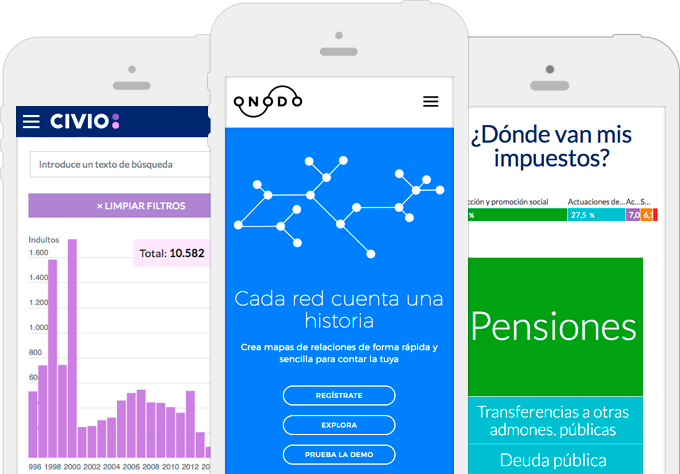
-
Almost 25,000 people and organizations created over 12,000 interactive visualizations of networks and nodes using Onodo.org.
-
More than 31,356 people used ¿Dónde van mis impuestos? to easily explore the General State Budgets.
-
Some 23,000 users browsed over 4,500 files on organizations, politicians and businessmen via Quién Manda to learn about their relationships.
-
The pardon search engine on Pardonometer, a unique tool in Spain, has been accessed by over 1,200 users.
-
More than 4000 people used the search facility for public works on Quién cobra la obra and the records of construction groups and awarding authorities.
-
1,612 unique users accessed the Spain in Flames app to interactively explore detailed information on major forest fires in Spain.
With other organizations
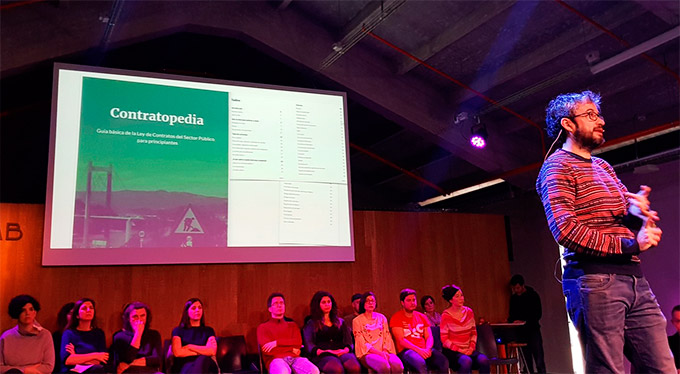
David Cabo at Medialab-Prado | Yago Bermejo
Throughout 2018 we have participated in meetings such as the II Hispano-American Forum on Scientific Journalism in Mexico, the V Global Fact Checking Summit in Rome, The International Journalism Festival in Perugia, the Science in Parliament workshop, the fifth symposium of the Council for Transparency on the need to streamline administrative terminology, the Calala Fondo Mujeres workshop on reproductive rights, the Un año en un día event by Medialab-Prado, the Journalism workshops held at the Universidad Complutense, the Datacommons Lab by Think Commons and Estudio Montera 34, the Complutense and Cátedra FarmaMundi summer school on healthcare access, the G-lab2018 by Pinto town council into transparency in local government, the Forum on Open Government by the Secretary of State for Civil Service, the International Week of Open Administration, and the presentation of the Opentender.eu project by Digiwhist at the European Parliament, among others.
We have also delivered training on the Master’s in Investigation and Data Journalism by Unidad Editorial, the Master’s in Integrative Molecular and Cellular Biology at CSIC and UIMP, and at the Forum for Transparency and Democratic Innovation in Aragón - Gobierno Abierto. We also renewed our cooperation protocol with the Council for Transparency.
With Public Authorities
In 2018 we launched 10 new projects on transparency in public authorities based on ¿Dónde van mis impuestos?, the tool that allows you to visually, easily and transparently browse how public money is spent. The town councils of Las Palmas, El Prat de Llobregat, Montmeló, Cheste, Mahón and the Consell de Menorca are just some of the local authorities who we’ve helped to open their budget data in 2018, with 4 other projects already underway and which will see the light of day in 2019. With the addition of these there are now around 40 public organizations using our app, and over 17 million citizens who are able to use it to consult their local or regional budgets in an easy-to-understand format. Furthermore, we helped the Torrelodones Town Council to celebrate its third meeting of participatory budgets.
Training for professionals in the public sector is another one of our lines of cooperation. This has seen us training public officials from the Community of Madrid to give them the theoretical and practical tools that will enable them to better respond to citizens’ requests for information and transparency.
Goals set out in the 2018 Action Plan:
Provide tools and processes to bolster citizens' capacity to control public authorities.
Build capacity in civil society to better participate in public processes.
Team
In 2018 we updated our Board of Trustees with the addition of three new members: José Luis Marín (Euroalert), Marisol García (RAIS Fundación) and Olivier Schulbaum (Goteo). José Luis, Marisol and Olivier thus join Rodrigo Tena, whose term has been renewed, Javier de la Cueva and Civio’s two founding trustees (Jacobo Elosua and David Cabo) to help us make strategic decisions to grow and develop as an organization. Helen Darbishire and François Derbaix, whose tenure ended in December 2017, continue to work with Civio as members of the foundation’s Advisory Board.
Furthermore, in December 2018, Civio recognized the leadership role that Eva Belmonte had been performing (until this point, she was head of projects) and named her joint director of the organization, along with David Cabo. The team is currently made up of 9 people working full-time and an assistant who works in the final quarter of the year.
Accounts
In 2018, Civio has remained a sustainable organization in financial terms. The year closed with a pre-tax operating profit of €83,136 according to provisional annual accounts (which will be externally audited, as always). Income totaled €519,928, an increase of 28% over the previous year, and a gain of 13% on the forecast of €459,800 set out in the Action Plan.
Expenditure reached €433,001, less than our forecast for the year, which we estimated at €458,597. The major share of this, some 84%, was spent on staff salaries, which remained within the salary bracket of between €22,500 and €30,000, to which a variable bonus was added to the sum of €15,000 gross, shared by the team for end of year results. In addition, we hired an intern to the tune of €1,200 gross per month. The salary of the executive director stayed the same as 2017, at €39,500.
Income
Expenses
2018 revenue (€519,928) came from:
-
Civio members and one-off donations (€58,130, 11% of the total)
Regular donations by our members and others who have made ad hoc donations have proved vital: these increased some 60% over the previous year and we closed the year with 438 members. Total revenue as a result of such financial assistance was 24% more than forecast in the Action Plan, although membership numbers are less than our start-of-year forecast.
-
Provision of professional services (€232,803, 45% of the total)
Revenue from technical support services for institutional transparency (based on the ¿Dónde van mis impuestos? tool) was lower (€217,068) than in 2017, although it continues to be a significant pillar of our sustainability. In addition to this is revenue from training, which amounted to €15,735. Income from services rendered was slightly lower than forecast in the 2018 Action Plan (€240,000).
-
Institutional funding and awards (€228,995 or 44% of the total)
Income from institutional support and grants increased almost 64% over the previous year, and came in their entirety from outside of Spain, as in previous years. Our participation in the European Union FANDANGO project (€106,594), the support of two grants from OSIFE (Open Society Initiative for Europe, €101,800 in sum), the Google grant to develop a prototype to analyze video transcripts for journalistic purposes (Google Digital News Initiative, €12,195) and the grant from the European Journalism Center to conduct Medicamentalia—Contraceptives (funding for this investigation in 2018 was €8,406) provided this part of our funding.
Diversity in our sources of funding allows us to react more flexibly when faced with unforeseen events, and we have continued to make progress in one of our main goals since 2017: that Civio’s partners and donors acquire more weight in our financing to provide us with greater stability and independence as opposed to other means i.e. the provision of services, participation in international projects, securing grants—all far more unpredictable and requiring a large amount of resources and learning.
Since our launch, our annual accounts have been available to the public. These can be browsed here.
Goal set out in the 2018 Action Plan:
Maintain the sustainability of our growing organization. Income has exceeded our forecasts, we have grown yet again and we face 2019 with stability and optimism.
Increase membership and the number of donors at a sufficient pace to afford more stability and independence compared to other financial means.
Thanks
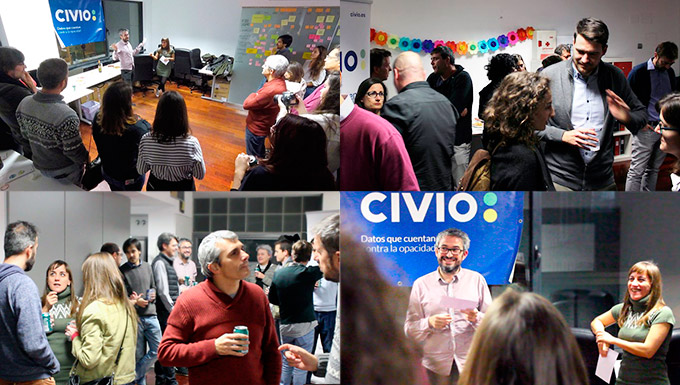
2018 Civio Christmas Get-Together
We seek lasting, measurable impact, and over the years we have achieved highly significant change for the common good. None of this would be possible without the many people who drive us every day to continue to promote transparency and accountability with more determination that ever before. Their names would take up more space than this entire report. Our warmest thanks go to each and every one of them:
-
First and foremost, the almost 500 members who make monthly donations, as well as the 1,300 donors who have made ad hoc donations to our organization since we started out. Living up to the trust you place in us is our top priority.
-
To everyone who has selflessly collaborated with us throughout 2018. For example, to advance our ‘Bono Social’ app (for the social rate in utilities).
-
To all of the authorities and professionals in the public sector who have listened to us in finding the way to open their institutions to the public.
-
To the media who put trust in our projects and all those who re-publish our materials, reaching more people by the day.
-
To the dozens of civil society organizations which, in Spain and other countries, share their formidable knowledge and expertise with us.
-
And to the many thousands of people who follow and share our work with interest. We strive to show, via discipline and credibility, that if you support us, it will be worth it.
Our greatest achievement has been to close 2018 with you by our sides, and with the will to work hard and achieve a greater impact—with your help.
Thanks for your trust!
Jacobo, David, Eva, Raúl, Miguel Ángel, Amir, Eduardo, Ángela, María and Javier.
We need your donations to continue monitoring public authorities and put an end to opacity.
Helping us to keep our work INDEPENDENT is the only way we can carry on doing our duty.